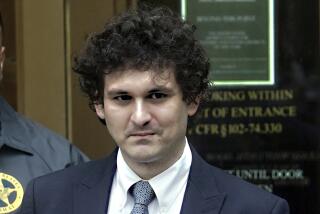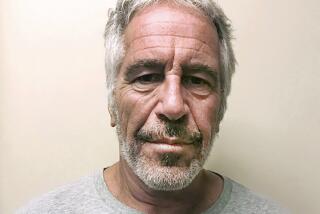JPMorgan to pay $2.6 billion for failing to report Madoff concerns
- Share via
When Bernard L. Madoff’s Ponzi scheme was revealed five years ago, the big question was whether he pulled off the jaw-dropping crime by himself.
Madoff stubbornly claimed to have acted alone, but it became clear Tuesday that he got a significant assist from one of the world’s premier financial institutions.
JPMorgan Chase & Co. agreed to pay $2.6 billion for ignoring numerous warning signs that could have exposed the $17.5-billion fraud years earlier.
Internal emails showed that JPMorgan employees repeatedly questioned the towering investment returns that Madoff claimed to be notching. One analyst wrote that the “numbers didn’t add up.” The financial giant warned British authorities that Madoff’s returns “appear too good to be true — meaning that it probably is.”
The bank even withdrew most of its own money from Madoff. But JPMorgan officials didn’t report their concerns to U.S. securities regulators.
“JPMorgan — as an institution — failed and failed miserably,” Preet Bharara, the U.S. attorney in Manhattan, said at a news conference. “In part because of that failure, for decades Bernie Madoff was able to launder billions of dollars in Ponzi proceeds.”
The bank said in a statement that it “could have done a better job pulling together various pieces of information and concerns about Madoff.” But the company also said it fell prey to the master con artist.
“We do not believe that any JPMorgan Chase employee knowingly assisted Madoff’s Ponzi scheme,” the bank said. “Madoff’s scheme was an unprecedented and widespread fraud that deceived thousands, including us, and caused many people to suffer substantial losses.”
Legal experts and investors scoffed at that notion.
“For them to have been blind to this for all these years is not very likely,” said Fred Silton, a 90-year-old Los Angeles real estate investor, who said he entrusted a “significant” amount of money with Madoff. “Somebody kept their eyes closed, and that’s not the way it should be.”
Irving Picard, the government-appointed trustee overseeing the Madoff case, said Tuesday that he had recovered nearly $10 billion, or 59%, of the $17.5 billion that investors lost to Madoff. That’s a far higher percentage than in most cases, but it’s unlikely that investors will recoup all their losses, experts said.
Much of the $2.6-billion payout will be returned to Madoff’s victims. The money comes from several deals that the bank struck.
The Justice Department will receive $1.7 billion from the bank, which will be paid out through the agency’s Madoff Victim Fund. A separate $543 million will go to Picard, who sued JPMorgan on behalf of Madoff victims. In addition, the bank said it would pay a penalty of $350 million to the Office of the Comptroller of the Currency.
The huge amount indicates that JPMorgan had significant culpability, said Cornelius Hurley, director of the Boston University Center for Finance, Law & Policy.
“The number is shocking,” Hurley said. “What that number says to me is there are some very damaging facts behind it. Otherwise, they wouldn’t have paid it.”
The Justice Department alleged that JPMorgan failed to file “suspicious activity” reports about Madoff and had an inadequate program for preventing money-laundering. The government deferred the prosecution of those charges in exchange for the financial payment and a series of reforms.
No JPMorgan employees were charged with wrongdoing — a fact that elicited anger from critics of Wall Street.
“Banks do not commit crimes; bankers do,” said Dennis Kelleher, chief executive of Better Markets Inc., a watchdog organization. “Until individuals, including executives, are held personally liable, fined and jailed, the crime spree [on Wall Street] will continue.”
The legal settlements are a capstone to one of the most audacious scams in modern American history.
Madoff burst into the public consciousness in December 2008 when his two sons told authorities that their father had confessed to masterminding the decades-long fraud. One of the two sons, Mark, committed suicide two years later.
Madoff pleaded guilty in March 2009 and is serving a 150-year sentence in federal prison. Eight of his former employees, including his brother, also have pleaded guilty to crimes related to the fraud.
“Madoff is a perfect example of truth being stranger than fiction,” said Michael Weinstein, a former federal prosecutor who now heads the white-collar defense practice at law firm Cole Schotz. “Unfortunately, so many people were devastated by his fraud and it reached throughout the country and the world.”
The Madoff penalty is the latest in a series of embarrassments for JPMorgan.
In November, the banking giant agreed to pay $13 billion to resolve myriad investigations into its sale of mortgage-backed securities ahead of the 2008 global financial crisis.
In 2012, the bank admitted that it lost $6.2 billion in risky investments made by a rogue trader who became known as the “London Whale.” Senate investigators later issued a report slamming the bank for failing to catch the high-risk market bets despite numerous red flags.
Madoff’s relationship with JPMorgan started in 1986 and lasted for 22 years. Suspicions about him arose as early as 1994, but the bank didn’t notify U.S. regulators until after his arrest, according to documents released Tuesday. A rival bank with similar suspicions, by contrast, closed Madoff’s accounts and warned U.S. regulators.
In 2006, JPMorgan invested some of the bank’s own money with Madoff through so-called feeder funds. Within two years, it had about $379 million with him.
In October 2008, a London-based JPMorgan analyst wrote a lengthy email questioning the bank’s investments with Madoff.
The analyst said the bank appeared to be “relying on Madoff’s integrity,” while doing little to verify his investments. The email noted that several “feeder fund” managers appeared to fear Madoff “and no one dares to ask any questions as long as the performance is good.”
Thirteen days later, JPMorgan related its suspicions about Madoff to authorities in Britain, saying the investment performance achieved by the funds “is so consistently and significantly ahead of its peers year-on-year … as to appear too good to be true — meaning that it probably is.”
The bank did not inform U.S. regulators.
Instead, JPMorgan began withdrawing its money from the Madoff funds. By the time he was arrested two months later, the bank had reduced its position to $81 million.
On the day of Madoff’s arrest, a JPMorgan executive emailed the analyst who wrote the October email: “Can’t say I’m surprised, can you?”
“No,” the analyst replied.
With the bank having limited its losses, another JPMorgan employee later boasted: “We actually look like we have some clue of what we’re doing.”
After Madoff’s arrest, JPMorgan filed its first suspicious activity report about him to U.S. authorities.
More to Read
Inside the business of entertainment
The Wide Shot brings you news, analysis and insights on everything from streaming wars to production — and what it all means for the future.
You may occasionally receive promotional content from the Los Angeles Times.











